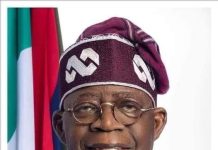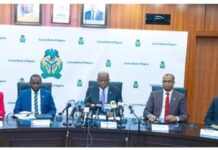
By Olusegun Adeniyi
Source: Thisday
Were he to be alive, Bashorun Moshood Kashimawo Olawale (MKO) Abiola would have marked his 80th birthday today. He was born on 24th August 1937. And without any doubt, today would have been a remarkable day in Lagos, for Abiola was indeed a man of the people.
Yet, he is practically forgotten despite the fact that the democracy we currently enjoy can be credited to his sacrifices and that of a few others who challenged the military that had practically held the nation by the jugular. And he paid a very big price for that: He was incarcerated under a most dehumanizing condition, his wife, Kudirat was murdered, his businesses were ruined and eventually, he lost his life.
What that compels is a reflection on the part of those who only remember Abiola on June 12, essentially for political reasons even when they do nothing to advance the cause for which he died. Granting holidays on June 12 every year in a section of the country when Abiola’s appeal was national, is cheap and meaningless. What would be more enduring is to have a befitting centre in Abiola’s name, like that of his friend (now also of blessed memory), Shehu Musa Yar’Adua that stands as a lasting memorial in Abuja.
There must also be a compelling book on Abiola that would deal with four notable areas of his life: Politics, business, philanthropy and sports. That is the sort of legacy Abiola deserves and it is possible if there is a commitment to it, especially as we move towards the 20th anniversary of his death which is next year.
Meanwhile, as a State House Correspondent in the early nineties, I was a member of the African Concordmagazine delegation to Jos in April 1993 when Abiola contested the Social Democratic Party (SDP) presidential primaries and I followed all the political drama from the beginning to the end. In August 1997, as an Assistant Editor at Sunday Concord, I wrote a book to commemorate Abiola’s 60th birthday at a time he was in detention.
Titled “Abiola’s Travails”, the publication was partly financed by the then PUNCH Chairman, Chief Ajibola Ogunsola, easily one of the few genuine friends of Abiola and for me a professional mentor.
Although I no longer have a copy of the book, on Tuesday I asked whether Louis Odion (a friend I know to be very meticulous in keeping records) still has his. Not surprisingly, Louis still does and he lent me the copy I autographed for him on 28th August 1997 with a stern warning that I must return it to his library.
In future, I may merge the book with ‘Fortress on Quicksand’ (on how and why 23 presidential aspirants were disqualified in November 1992) and ‘The Last 100 Days of Abacha’ since they follow the same thread and rework them before republishing as a single book. But that is not a priority project right now.
In the foreword to “Abiola’s Travails”, Mr Lewis Obi, the then Managing Director and Editor-in-Chief of African Concord (now defunct like most other Abiola businesses) wrote: “Abiola was prevented from being president by approximately seven army officers and less than half a dozen politicians who subverted our institutions and committed the worst treason ever committed against the Nigerian state.
That a few desperate men could do so demonstrated the fragility of our institutions—from the army, through the political parties to the National Assembly and the judiciary. None of our national institutions could stand the rampage of a few power mongers and, thus, Nigeria was reduced to something slightly worse than a banana republic…Abiola’s travails are actually Nigeria’s travails. He promised the country prosperity.
Now the country is the seventh poorest in the world. He promised democracy. Nigeria is today under the grip of a regime regarded in the world as one of the most repressive and lawless. He promised to open up the country. Today, Nigeria is an international outcast. He promised a united country and the voters responded. Today, Nigeria is more divided than it was in 1914.”
It is indeed instructive that those words were written about the Nigeria of 1987!
On 16th January 1993 when he declared his intention to run for the presidency, Abiola said most memorably: “Everywhere you go, you find the African at the bottom of the ladder; some can’t even find the ladder. I will provide that ladder and help them to climb.”
He went on to run a most interesting campaign both for the SDP primaries which he won and subsequently the election that was aborted before the result could be announced. There was of course no doubt as to who the victor was.
Aside documenting Abiola’s political struggles from the moment he joined the presidential race to night he was arrested as recounted by Kudirat to how his businesses were ruined and the drama of the court appearances in the treason trial which I witnessed, I also highlighted a few personal indignities he suffered in detention. For instance, on 23 August 1994, Abiola had a scuffle with DSP Lawal Katsina in the office of ACP Felix Ogbaudu while his lawyers watched helplessly.
The fight began when Katsina sought to prevent Abiola from taking possession of the newspapers brought by his lawyes on the flimsy excuse that he wanted to screen them for concealed documents. In the process Katsina pushed Abiola who fell down. The police would later issue a silly statement that “it was chief abiolawho assaulted the officer” in the office of an assistant police commissioner!
Since the only opportunities he could speak came during the few court appearances before they were terminated in August 1987, Abiola on one occasion narrated his ordeals: “Up till Saturday morning I was at Bwari police station in a cell. At 2am on Saturday, some people entered the room and without telling me who they were or what their business was, they took everything in my room, including my tooth brush. No answer was given to any of the questions I asked them.
Since that time I have been unable to have sleep of any kind. On Saturday evening, I was moved to Kuje police station and there I was locked up in the room until the two occasions when I had visitors and once when I had to spray the room. The environment the police provided is not conducive to any sustenance of life. No amount of medical care would be of any help in that environment. I don’t have access to newspapers or radio.
The food provided is good but the environment does not enable one to eat the food. I am terribly concerned for being asked to go back to such a place is like sending me to an early grave.”
On the specific case of his brush with DSP Katsina, Abiola said since the court had granted him rights to newspapers, he saw no reason why he should be denied. “I respect every person that deserves respect but I have paid my dues. I could have forced the newspapers from the hands of the policemen.
They cannot beat me up. I am not afraid of death. This is not the type of country I want my children to live in; that is why we must change it. And we will change it,Insha Allah. I have been kept in five places. They took me to Kuje, then Bwari and last night, I slept on bare floor.”
While this is not an attempt to tell the story of that era, there is a way in which what happened to Abiola contributed to the challenge of nationhood that we are facing today and the military should take the blame. In 1998/99, Babangida and his men thought they could right the Abiola wrong by bringing General Olusegun Obasanjo from detention and working by sleight to have him emerge as the president of Nigeria.
What they failed to understand is that the bond of trust that had been broken by the manner in which the June 12 crisis was handled would take more than such cynical appeasement of Yoruba people to heal, especially within the context of Nigeria’s ethnic relations. But those are issues that we must deal with another day.
As I therefore conclude this piece in commemoration of Abiola’s 80th posthumous birthday with a reflection on what might have been, for the Twitter generation that may still be wondering about who this Abiola was, let me leave them with the words of Babangida.
In January 1988 when Abiola was conferred the title of Aare Ona Kakanfo of Yoruba land by the Alafin of Oyo, Oba Lamidi Adeyemi, the then military president wrote him a public letter which I reproduce below:
“Dear Generalissimo,
“My family and I heartily rejoice with you today on your installation as the 14th Aare OnaKakanfo of Yorubaland. The symbolism of the title vividly illustrates virtually every aspect of your life history which has been marked so far by one gallant battle after another. Your installation today is therefore a testimony to the inspiring success story of your life.
“You scored your first victory in your infancy being the first among many children of your parents to survive, after whom many others follow. Also, remarkably, you survived various odds not the least of which was grinding poverty to prepare yourself for the many battles ahead. You challenged racial prejudices in high places and won for your fellow citizens and black people, the right to fully realize their potentials in their chosen careers.
Your charity and deep concern for the less privileged are now legendary. While congratulating you on today’s richly deserved installation, we pray Allah to continue to guide and guard you in your sincere services to fellow men and to HIM, the almighty.”
M.K.O. Abiola may be long gone, he can never be forgotten!





